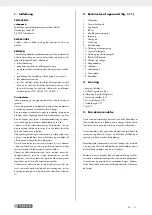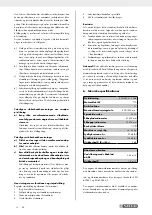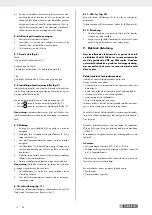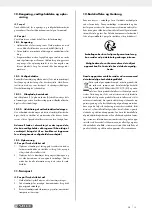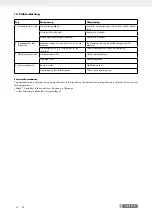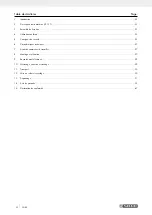
7
GB/IE/NI
8.12. After use
1. Switch off the power tool as described, disconnect it from
the power supply and Iet it cool down.
2. Clean and maintain the power tool as described under
point 10, and store it carefully.
9. Electrical connection
The electrical motor installed is connected and
ready for operation. The connection complies with
the applicable VDE and DIN provisions. The cus-
tomer‘s mains connection as well as the extension
cable used must also comply with these regula-
tions.
Damaged electrical connection cable
The insulation on electrical connection cables is often dam-
aged.
This may have the following causes:
• Passage points, where connection cables are passed through
windows or doors.
• Kinks where the connection cable has been improperly fas-
tened or routed.
• Places where the connection cables have been cut due to
being driven over.
• Insulation damage due to being ripped out of the wall outlet.
• Cracks due to the insulation ageing.
Such damaged electrical connection cables must not be used
and are life-threatening due to the insulation damage.
Check the electrical connection cables for damage regularly.
Make sure that the connection cable does not hang on the
power network during the inspection.
Electrical connection cables must comply with the applicable
VDE and DIN provisions. Only use connection cables with the
marking „H05VV-F“.
The printing of the type designation on the connection cable
is mandatory.
AC motor
• The mains voltage must be 220 - 240 V~ 50 Hz.
• Extension cables up to 25 m long must have a cross-section
of 1.5 mm
2
.
Connections and repairs of electrical equipment may only be
carried out by an electrician.
Please provide the following information in the event of any
enquiries:
• Type of current for the motor
• Machine data - type plate
8.3. Connection to the power supply
1. Make sure that the power tool is switched off.
2. Plug the power plug into a correctly installed socket which
complies with the requirements specified in the technical
data.
3. Your power tool is now ready for operation.
8.7. Switching on/off (fig. 8)
To switch on:
Push the on/ off switch (13).
Continuous operation (fig. 8)
Secure the on/off switch (13) with the locking knob (6).
To switch off:
Press the on/off switch (13) briefly and let go.
8.8. Adjusting the oscillation rate (fig. 9)
Before you start working, adjust the oscillation rate according
to the application. Use a low number of oscillations for rough
grinding, increase the oscillation rate for fine work.
Adjust the oscillation rate by pressing the button (5).
• Press the
button to increase the oscillation rate (fig. 9).
• Press the
button to decrease the oscillation rate (fig. 9).
Note:
The insertion tool moves for a short while after having it
switched off. Do not put aside the power tool until the insertion
tool has come to a complete halt.
8.9. Grinding
1. Attach an appropriate abrasive sheet (16) and select the
corresponding speed.
2. Hold the power tool securely at the handle surfaces (7, 2)
and switch it on as described.
3. Wait until the insertion tool has reached its full operating
speed.
4. Hold the grinding plate (1) as parallel as possible to the
wall, and touch the surface to be processed with the brush
edge (A) first.
5. Apply some pressure to the grinding head (1) such that
the insertion tool touches the surface to be processed.
6. Constantly move the power tool over the surface.
Note:
lf you want to avoid irregular grinding results, do not
keep the power tool at one spot for too long.
7. Lift the grinding plate (1) from the surface to be processed
before switching off the power tool.
8. Do not put aside the power tool until the insertion tool has
come to a complete halt.
8.10. Ceiling grinding (fig. 11)
For working in ceiling area, fix the grinding head with a cotter
pin (C) (included) as shown in figure 11.
8.11. LED light (fig. 10)
To ensure a well lit workplace, use the LED light (4) if necessary.
Press the switch (a) to switch ON/OFF the LED light (4).
Summary of Contents for 315148
Page 3: ...1 1 2 3 4 6 13 12 11 7 8 9 10 C 19 18 17 15 14 16 5 14 15 10 5 11 12 4 3 2...
Page 4: ...11 14 15 10 6 5 9 B 4 10 7 16 1 A 8 6 13 C...
Page 16: ...11 GB IE NI...
Page 49: ...44 GR CY 1 45 2 1 11 45 3 45 4 45 5 46 6 49 7 50 8 50 9 51 10 52 11 52 12 52 13 53 14 54 15 67...
Page 51: ...46 GR CY 5 m a b c a b c d e f a b c d e f g...
Page 52: ...47 GR CY a b c d e f g a b c d e f g a...
Page 53: ...48 GR CY a b c d a h i j k l m n o p...
Page 57: ...52 GR CY 10 3 m 1 2 11 m 1 2 3 12 220 240 V 50 Hz 25 m 1 5 10 m m 10 1 10 2 10 2 1 1 A 10 2 2...
Page 58: ...53 GR CY 2012 19 13 1 2 3 4...
Page 71: ...66 DE AT CH...
Page 73: ......
Page 74: ......
Page 75: ......


















